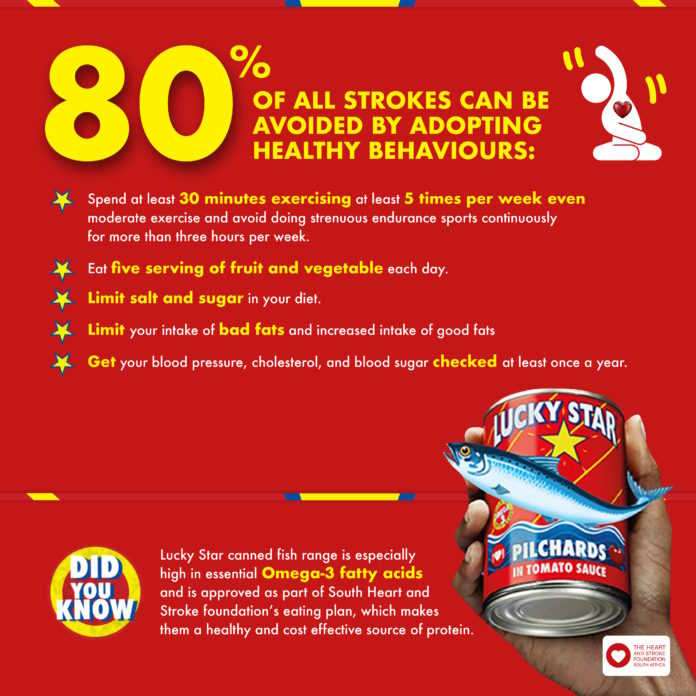New research reveals that heart disease claims the lives of 225 South Africans daily, with strokes affecting TEN individuals every hour. Shockingly, 80% of these heart diseases and strokes can be prevented, according to findings from the Heart and Stroke Foundation of South Africa (HSFSA).
Know Your Heart. Love Your Heart
Cardiovascular disease (CVD) and strokes are global killers, responsible for approximately 17.9 million deaths annually, as per 2021 data from the World Health Organization. Recognising the gravity of these statistics, it’s imperative to highlight the symbiotic relationship between heart health and brain well-being. Few realise the direct connection between heart health and brain function. A robust heart, the body’s natural pump, ensures a continuous flow of oxygen and nutrients to the brain. This steady supply is vital for optimal brain performance, supporting memory, cognitive function, and overall well-being.
September and October are pivotal months for heart and brain health awareness, marking Heart Awareness Month, World Heart Day (29 September), World Stroke Week, and World Stroke Day (29 October). These initiatives aim to raise awareness of the importance of maintaining a healthy heart, reducing the incidence of heart disease and strokes, and encouraging lifestyle choices that promote well-being.
Love Your Brain. Move Your Body
Lucky Star, a beloved South African brand, underscores the role of Omega-3 fatty acids in promoting cardiovascular health. Studies confirm that consuming Omega-3-rich foods, like Lucky Star canned fish products, at least twice a week can reduce blood pressure, lowering the risk of heart disease and strokes.
Prof. Pamela Naidoo, CEO of HSFSA, emphasises that Omega-3 fatty acids are essential for both heart and brain health. Scientific research supports their benefits for cardiovascular health, including reducing inflammation, enhancing blood vessel function, and overall heart health. These fatty acids also play a pivotal role in lowering blood pressure, preventing blood clots, and regulating heart rhythms.
Rapula Pitsoe, Lucky Star Senior Brand Manager, adds that Omega-3 fatty acids boost learning, memory, cognitive well-being, and blood flow in the brain. They are also known for their anti-inflammatory properties, reducing the risk of various diseases. To reduce the risk of CVDs and strokes, people of all ages should consider incorporating Omega-3-rich diets, such as Lucky Star canned fish products, into their meals. Coupled with regular exercise and a balanced diet, caring for your heart paves the way for a healthier mind.
About Lucky Star
Lucky Star has been helping generations of South Africans put tasty and nutritious meals on the table and in the lunch box since 1959. Trusted for its great taste and consistent quality, Lucky Star offers value for money and convenience while giving South Africans access to protein-rich meals and essential Omega-3 fatty acids.
Lucky Star has always strived to create products that are loved, creating new and exciting variants for the table. We’re making sure that what’s in the can is tasty and nutritious, and we’re working with the South African Chefs Association to help our fans make tasty and nutritious meals for every occasion packed with the goodness of Lucky Star.
Lucky Star products are GMO-free, high in protein, and contain no additional oil. The proudly South African brand is committed to sustainability and, with over 800,000 cans consumed daily, confirms it is a flavourful favourite of the nation.
For more information, please visit www.luckystar.co.za or follow us on X (Twitter) @LuckyStarSA and on Meta (Facebook) @LuckyStarSA.
About the Heart and Stroke Foundation South Africa (HSFSA)
The HSFSA is a non-profit organisation leading the knowledge, awareness and prevention of heart disease and stroke by encouraging the public to adopt less risky health behaviours. The Foundation is also involved in advocacy and works with the National Department of Health and other relevant stakeholders to promote health and prevent CVDs.
For more information, please visit www.heartfoundation.co.za or follow us on X (Twitter) @SAHeartStroke and on Meta (Facebook) @HeartStrokeSA.












